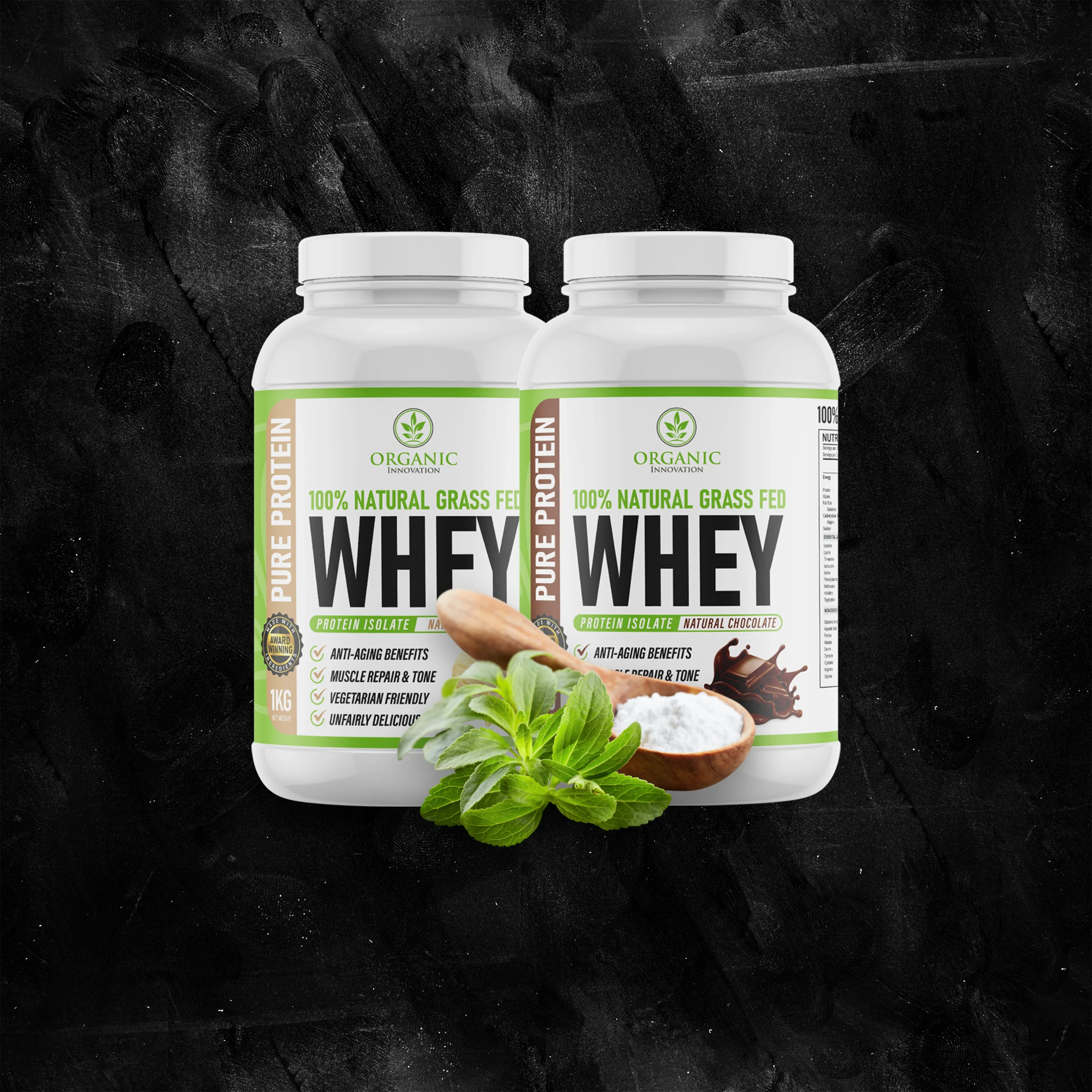Have you ever wondered what’s really in your protein shake? While most people focus on protein content, many overlook the artificial sweeteners and additives lurking in their favourite supplements. If you’re consuming protein powder daily, you might be unknowingly exposing yourself to chemicals like sucralose, aspartame, and acesulfame potassium—ingredients that research increasingly links to digestive issues, metabolic disruption, and other health concerns.
This comprehensive guide will help you understand why choosing protein powder without artificial sweeteners matters for your long-term health, how to identify truly natural options, and why whey protein powder without artificial sweeteners delivers superior results for your wellness goals.
What are Artificial Sweeteners in Protein Powders
Before you can make informed choices about your protein supplement, you need to understand what artificial sweeteners are, why manufacturers use them, and what alternatives exist in the marketplace. Many protein powders rely on synthetic ingredients to mask the natural taste of protein while maintaining low-calorie counts.
Common Artificial Sweeteners to Avoid
- Sucralose (Splenda)
- A common artificial sweetener in protein supplements.
- 600 times sweeter than sugar.
- May negatively affect gut bacteria and microbiome balance.
- Aspartame
- Controversial artificial sweetener; breaks down into methanol and amino acids.
- Some report headaches, dizziness, and digestive issues after consumption.
- Essential to avoid in clean protein powder options.
- Acesulfame Potassium (Ace-K)
- Often found in combination with other sweeteners, such as sucralose.
- Approximately 200 times sweeter than sugar.
- Essential to read labels for avoidance.
- Overall Concerns
- Companies prioritise taste and cost over health by using artificial sweeteners.
- Consumers must be vigilant when choosing protein powders that do not contain harmful additives.
Natural Sweeteners: Not Always Better
- Stevia, while natural, can cause problems for many users due to its distinctive aftertaste.
- Protein powder without stevia is beneficial for individuals with digestive upset, bloating, or hormonal sensitivity.
- Sugar alcohols like erythritol and xylitol are often found in “sugar-free” protein powders and can cause digestive distress.
- Avoiding sugar alcohols can help resolve digestive issues related to supplements for many people seeking clean protein powder.
- The digestive system responds differently to various sweeteners, making it essential to choose high-quality protein powders free from all sweeteners for optimal gut health.
Why Choose Protein Powder Without Artificial Sweeteners?
Making the switch to clean protein powder delivers benefits that extend far beyond simply avoiding chemicals. Choosing protein powder without artificial sweeteners can enhance your overall health and wellness.
Health Benefits of Sweetener-Free Protein
- Protects Your Microbiome: Sweetener-free protein powders help maintain gut health by avoiding disruptions caused by artificial sweeteners, leading to better nutrient absorption and improved immunity.
- Supports Stable Blood Sugar: Eliminating artificial sweeteners helps avoid insulin responses, ensuring better blood sugar control and reducing the risk of insulin resistance.
- Reduces Inflammation: Choosing protein powders without artificial additives can lower your exposure to potential inflammatory triggers, supporting overall health and reducing the risk of chronic diseases.
- Minimises Chemical Exposure: Opting for natural ingredient protein powders helps reduce your chemical burden, aligning with a cleaner lifestyle approach.
- Maintains Hormonal Balance: Free from artificial sweeteners, clean protein powders support hormonal regulation, which is crucial for energy, mood, metabolism, and reproductive health.
Who Should Avoid Artificial Sweeteners?
- If you experience bloating, gas, cramping, or irregular bowel movements, artificial sweeteners might be contributing factors. Switching to a protein powder supplement with no artificial sweeteners can resolve chronic digestive complaints.
- Individuals with autoimmune diseases should consider eliminating potential triggers, including artificial additives. Finding the best whey protein powder without chemicals is essential for managing their condition.
- During pregnancy and breastfeeding, everything you consume affects your baby. Many expectant and nursing mothers prefer choosing a protein powder for women that’s free from artificial sweeteners for peace of mind.
- Headaches, mood changes, energy crashes, or unexplained symptoms after consuming protein shakes may indicate sensitivity to sweeteners. Switching to the best protein options without these additives often provides clarity and relief.
Types of Whey Protein Powder Without Artificial Sweeteners
Understanding your options helps you select the right protein powder for your specific needs. It’s essential to consider the ingredients in your protein powder, especially if you want one without artificial sweeteners. This choice can impact not only the taste but also the nutritional profile. By making an informed decision, you can find a protein powder that aligns with your health goals.
1. Unflavored Whey Protein Isolate
Whey protein isolate represents the most refined form of whey protein, containing 90-95% protein by weight. When produced without artificial sweeteners, it delivers pure amino acids with minimal lactose, fat, or carbohydrates. This unflavored protein powder provides the cleanest protein source available from dairy.
Without artificial flavouring, whey protein isolate has a mild, slightly milky taste that most people find neutral and pleasant. This natural profile makes it incredibly versatile—you can add it to sweet or savoury applications without clashing flavours. The protein content per serving typically ranges from 20 to 25 grams of protein per scoop.
Whey protein is a high-quality complete protein containing all nine essential amino acids in optimal ratios for muscle protein synthesis. This completeness makes whey protein superior to many plant protein alternatives. The neutral taste means unlimited customisation potential, ensuring you’ll never tire of your protein supplement.
2. Grass-Fed Whey Options
Grass-fed whey protein is derived from cows raised on pasture, consuming their natural diet. This farming practice produces nutritionally superior milk with better fatty acid profiles, including higher omega-3 content. When choosing grass-fed whey protein isolate, you’re selecting protein from healthier, more humanely raised animals.
Grass-fed dairy operations typically avoid synthetic hormones, such as rBGH, and minimise antibiotic use. This means that your protein powder, which contains grass-fed whey, is cleaner from source to finished product. Beyond basic protein content, grass-fed whey protein isolate offers enhanced nutrition through bioactive compounds, immunoglobulins, and micronutrients.
3. Organic Whey Protein
Organic protein powder must meet strict USDA requirements prohibiting synthetic pesticides, herbicides, GMOs, and artificial additives. Organic certification inherently means no artificial sweeteners, flavours, or preservatives. This makes organic protein powder, free from synthetic ingredients, a guaranteed choice for clean supplementation.
The rigorous standards required for organic certification ensure consistent quality. Companies invested in organic production typically maintain higher overall quality standards, resulting in superior protein supplements. This attention to detail extends to every aspect of production, ensuring the delivery of the best protein powder possible.
Choosing the Best Protein Powder Without Artificial Sweeteners
Navigating supplement labels requires knowledge and attention to detail. It’s essential to understand the ingredients listed to make informed choices. Many consumers seek products like protein powder that do not contain artificial sweeteners. Being aware of the presence of additives can help you choose healthier options.
Reading Labels Like an Expert
- Check the Ingredient List: Look for ingredients that end in “-ose,” indicating sugars, and be cautious of artificial sweeteners like sucralose, aspartame, and acesulfame potassium.
- Avoid Vague Terms: Be wary of vague terms like “natural flavours,” which can hide numerous processed ingredients.
- Minimal Ingredient List: The best protein powder should have a simple ingredient list, ideally containing just whey protein isolate and possibly lecithin for mixability.
- Understand “Natural Flavours”: Recognise that “natural flavours” can include a wide range of processed ingredients, including solvents and preservatives.
- Look for Certifications: Seek third-party certifications such as USDA Organic, Non-GMO Project Verified, NSF Certified for Sport, or Informed Choice to ensure product integrity.
- Trust Independent Verifications: Certifications confirm that the ingredients listed match what’s actually in the container, providing accountability in your choice.
Marketing Claims vs. Reality
- “No sugar added” misleads consumers. While technically accurate—no table sugar was added—products still contain artificial sweeteners or sugar alcohols. Don’t let “sugar-free” fool you into thinking you’ve found protein powder without artificial sweeteners. Always verify the complete ingredient list.
- Unlike “organic,” the term “natural” has minimal regulatory oversight. Companies can use it liberally without meeting specific standards. A “natural” protein powder might still contain stevia, natural flavours, and various additives. When looking for a clean protein, disregard marketing language and focus on actual ingredients.
- Don’t hesitate to contact companies directly. Ask about their sourcing, whether they use artificial sweeteners, how they ensure purity, and what testing they perform. Responsive, transparent companies will answer gladly.
Third-Party Testing Importance
Third-party testing by labs unaffiliated with manufacturers provides an unbiased assessment of protein content, purity, and quality. This testing confirms the amount of protein actually matches label claims. The best protein powder companies invest in this verification proactively.
Beyond environmental contaminants, testing checks for adulteration with cheaper protein sources or fillers. Third-party screening protects consumers from these deceptive practices, ensuring you’re getting the pure protein you’re paying for.
Best Ways to Flavour Your Sweetener-Free Protein
Unsweetened protein powders can be incredibly versatile and tasty when used correctly. They can be incorporated into various recipes to enhance flavour without added sugars. By experimenting with different ingredients, you can create delicious protein-packed meals and snacks.
Natural Sweetener Alternatives You Control
- Blend your protein shake with fruits like bananas, berries, or mangoes for natural sweetness and added nutrients.
- Use Medjool dates for concentrated sweetness and a caramel-like flavour that complements plain whey protein.
- Add a teaspoon of raw honey to sweeten your shake while benefiting from its antimicrobial properties and antioxidants.
- Incorporate real maple syrup for a mineral boost, including manganese and zinc.
- Sweeten your shake with organic coconut sugar for a subtle caramel flavour and lower glycemic impact.
- Control the sweetness in your protein shake by adjusting the ingredients to suit your preferences and gradually reducing the sweetness over time.
- Customise your protein shake for different times of day or specific purposes to better suit your needs.
Flavour Enhancers Without Sweeteners
- Pure vanilla extract adds rich flavour without sweetness.
- Unsweetened cocoa powder creates a chocolate protein powder experience without artificial sweeteners or added sugar.
- Cocoa provides flavonoids, antioxidants, and mood-supporting compounds.
- Cinnamon, nutmeg, cardamom, and ginger add complexity and warmth to protein shakes without calories or sweeteners.
- Brew strong coffee or espresso and use it as your liquid base for protein shakes.
- Almond butter, peanut butter, or cashew butter add richness, healthy fats, and subtle sweetness.
Creative Recipe Ideas
- Try a tropical blend with pineapple, mango, coconut milk, and protein.
- Create a green machine with spinach, apple, ginger, lemon, and protein.
- Finding a high-quality protein powder without artificial sweeteners doesn’t mean sacrificing taste—it means gaining creative freedom.
- Protein pancakes, muffins, and cookies benefit from the neutral profile of unflavored protein.
- Blend hot coffee, unflavored protein, a splash of milk, vanilla extract, and optional sweetener for a homemade protein latte.
- Stir protein into tomato sauce, cream soups, or scrambled eggs—the neutral taste allows seamless integration.
Whey Protein Powder Without Artificial Sweeteners vs. Sweetened Options
Understanding the differences between clean protein and conventional protein is essential. This knowledge enables you to understand why selecting protein powder without artificial sweeteners is crucial. Clean protein typically contains fewer additives and preservatives. As a result, it aligns better with health-conscious choices.
Nutritional Comparison
Clean protein powder typically contains 100-110 calories per 25 grams of protein per serving. Sweetened alternatives often contain 120-180 calories per serving, primarily due to the addition of these ingredients. The best protein powders without artificial sweeteners contain less than 2 grams of carbohydrates per serving, while flavoured versions often contain 3-8 grams.
Clean whey protein isolate should deliver 90-95% protein by weight. Flavoured alternatives might only reach 70-80% because flavourings, sweeteners, and fillers occupy space. Clean protein lists typically contain 1-2 components, while flavoured varieties may list 15-20 ingredients.
Long-Term Health Impacts
Regular exposure to intensely sweet substances can increase cravings for sweetness and lower preference thresholds. By choosing protein powder with no artificial sweeteners, you protect your palate from this conditioning effect.
Emerging research suggests artificial sweeteners may influence metabolism beyond their zero-calorie status. Some studies link them to glucose intolerance, altered insulin responses, and even weight gain. Long-term consumption of artificial sweeteners may change the composition of gut bacteria, potentially affecting immunity, mental health, and metabolism.
Common Myths About Unsweetened Protein Powder
1. Debunking Taste Concerns
Quality whey protein has a mild, neutral taste most people find pleasant. When you blend it with any flavorful ingredients—such as fruit, cocoa, coffee, or spices—the protein essentially blends into the overall taste profile. Many users report that after adjusting to unsweetened options, artificially flavoured protein powders taste chemical and unpleasant.
Far from limiting options, choosing unsweetened protein expands possibilities. You’re not locked into predetermined flavours. This flexibility makes unflavored the most versatile form of protein available.
2. Effectiveness Myths
Muscles respond to amino acids, not flavours. Whether sweetened or plain, protein powder supplies the same muscle-building benefits as long as it contains the same amount of protein per serving. The 20 grams of protein in flavoured powder build no more muscle than 20 grams of protein from unflavored sources.
Athletic performance improves when you meet protein needs with high-quality sources. Artificial sweeteners provide zero performance advantages. Many elite athletes specifically choose grass-fed whey protein powder without additives, recognising that purity supports peak performance.
Organic Innovation’s Clean Protein Philosophy
At Organic Innovation, our approach to supplementation reflects a deep commitment to your health and well-being. Our whey protein powder contains only what your body recognises and utilises: high-quality amino acids from grass-fed sources. Every batch undergoes rigorous third-party testing for purity, potency, and safety. Our scientifically researched approach ensures that our products are proven 100% effective in achieving positive, long-term health results within the body. We’re not interested in quick fixes—Organic Innovation creates supplements that support wellness over years and decades.
The case for choosing protein powder without artificial sweeteners rests on compelling evidence spanning taste, health, and long-term wellness. Clean protein supports better health outcomes than artificially enhanced alternatives. When you choose whey protein powder without artificial sweeteners, you protect your gut microbiome, maintain stable blood sugar, reduce inflammation, and eliminate chemical exposure—all while meeting your protein goals effectively.
Ready to experience the difference that pure, clean protein makes? Explore Organic Innovation’s range of protein powder without artificial sweeteners and discover how scientifically researched, naturally formulated supplements can transform your health journey. Visit our website today to learn more, or contact our team for personalised guidance. Your body deserves the best protein—give it the pure, natural nutrition it deserves.








